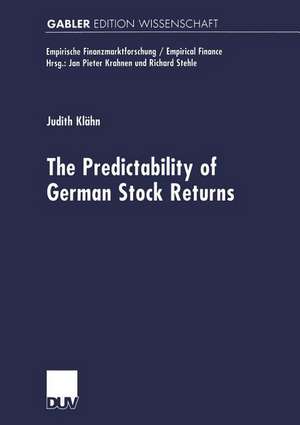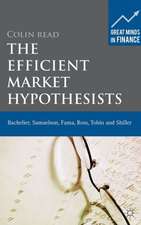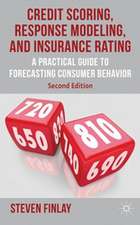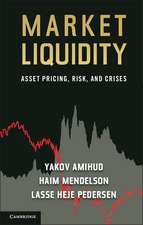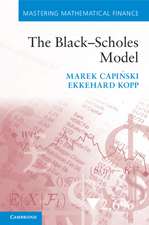The Predictabilty of German Stock Returns: Empirische Finanzmarktforschung/Empirical Finance
Autor Judith Klähnen Limba Engleză Paperback – 28 iun 2000
Din seria Empirische Finanzmarktforschung/Empirical Finance
-
 Preț: 354.56 lei
Preț: 354.56 lei -
 Preț: 378.16 lei
Preț: 378.16 lei -
 Preț: 485.46 lei
Preț: 485.46 lei - 15%
 Preț: 440.86 lei
Preț: 440.86 lei -
 Preț: 382.36 lei
Preț: 382.36 lei - 15%
 Preț: 536.16 lei
Preț: 536.16 lei - 15%
 Preț: 441.33 lei
Preț: 441.33 lei -
 Preț: 383.12 lei
Preț: 383.12 lei -
 Preț: 489.48 lei
Preț: 489.48 lei -
 Preț: 415.95 lei
Preț: 415.95 lei -
 Preț: 418.67 lei
Preț: 418.67 lei -
 Preț: 418.29 lei
Preț: 418.29 lei -
 Preț: 319.98 lei
Preț: 319.98 lei -
 Preț: 317.30 lei
Preț: 317.30 lei -
 Preț: 359.01 lei
Preț: 359.01 lei -
 Preț: 312.50 lei
Preț: 312.50 lei -
 Preț: 345.33 lei
Preț: 345.33 lei -
 Preț: 416.16 lei
Preț: 416.16 lei -
 Preț: 419.21 lei
Preț: 419.21 lei -
 Preț: 486.60 lei
Preț: 486.60 lei -
 Preț: 416.16 lei
Preț: 416.16 lei - 15%
 Preț: 442.98 lei
Preț: 442.98 lei -
 Preț: 353.02 lei
Preț: 353.02 lei -
 Preț: 417.14 lei
Preț: 417.14 lei -
 Preț: 446.08 lei
Preț: 446.08 lei -
 Preț: 447.99 lei
Preț: 447.99 lei - 15%
 Preț: 544.34 lei
Preț: 544.34 lei
Preț: 378.12 lei
Nou
Puncte Express: 567
Preț estimativ în valută:
72.35€ • 75.74$ • 59.87£
72.35€ • 75.74$ • 59.87£
Carte tipărită la comandă
Livrare economică 05-19 aprilie
Preluare comenzi: 021 569.72.76
Specificații
ISBN-13: 9783824471027
ISBN-10: 3824471027
Pagini: 144
Ilustrații: XIV, 128 p.
Dimensiuni: 148 x 210 x 8 mm
Greutate: 0.18 kg
Ediția:Softcover reprint of the original 1st ed. 2000
Editura: Deutscher Universitätsverlag
Colecția Deutscher Universitätsverlag
Seria Empirische Finanzmarktforschung/Empirical Finance
Locul publicării:Wiesbaden, Germany
ISBN-10: 3824471027
Pagini: 144
Ilustrații: XIV, 128 p.
Dimensiuni: 148 x 210 x 8 mm
Greutate: 0.18 kg
Ediția:Softcover reprint of the original 1st ed. 2000
Editura: Deutscher Universitätsverlag
Colecția Deutscher Universitätsverlag
Seria Empirische Finanzmarktforschung/Empirical Finance
Locul publicării:Wiesbaden, Germany
Public țintă
ResearchCuprins
1. Introduction.- 2. Theoretical Framework for Return Predictability.- 3. Literature Review on Empirical Studies.- 3.1 Tests for the U.S. Equity Market.- 3.2 Tests for Different National Equity Markets.- 3.3 Summary of Results on Monthly Return Predictability.- 3.4 Are Markets Integrated? Literature Review.- 4. Statistical Methods.- 4.1 Ordinary Least Squares.- 4.2 WHITE Correction for Heteroskedasticity.- 4.3 Generalized Method of Moments.- 5. Data.- 5.1 Frequency of Data.- 5.2 German Market Index and Industry Portfolios.- 5.3 Statistical Properties of Instruments Used in Previous Studies.- 5.4 Instruments Used.- 5.5 Summary Statistics.- 6. Empirical Results.- 6.1 German Instruments.- 6.2 German and World Instruments.- 6.3 German and U.S. Instruments.- 6.4 Summary of Results.- 6.5 Are World or U.S. Instruments More Important in Predicting German Stock Returns?.- 6.6 Test for Reunification Effects.- 6.7 Do German Instruments also Predict U.S. Stock Returns?.- 7. Conclusion.- 8. References.
Notă biografică
Dr. Judith Klähn promovierte bei Prof. Dr. Hellmuth Milde am Lehrstuhl für Geld, Kredit, Finanzierung der Universität Trier. Sie ist als Investmentbankerin bei der Deutsche Bank Securities im Bereich Asset Backed Securities in New York tätig.
Textul de pe ultima copertă
Extensive literature investigates the predictability of U.S. equity returns. This does not imply, however, that the results are equally valid for the German equity market.
Judith Klähn's central theory is that the German stock market is not comparable to Wall Street. She proves that some of the most important variables in predicting U.S. equity returns are not significant for the German stock market. The author shows that the composition of Germany's investor base plays an important role, and she outlines the variables crucial for the German stock market.
Judith Klähn's central theory is that the German stock market is not comparable to Wall Street. She proves that some of the most important variables in predicting U.S. equity returns are not significant for the German stock market. The author shows that the composition of Germany's investor base plays an important role, and she outlines the variables crucial for the German stock market.
